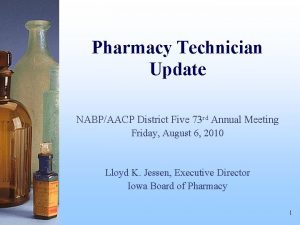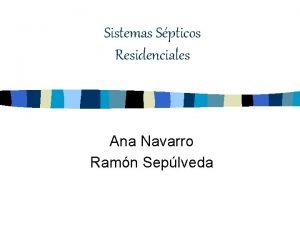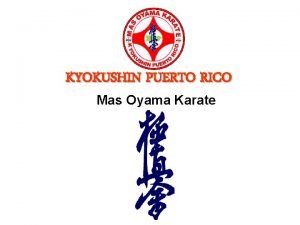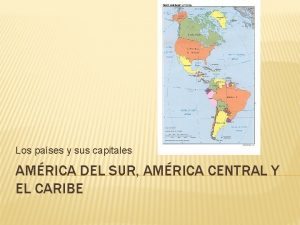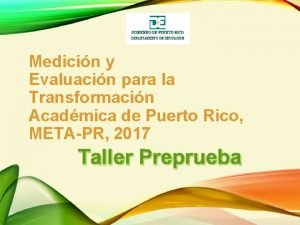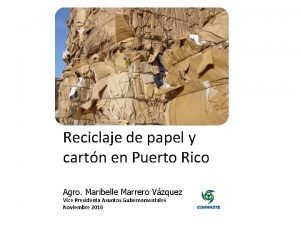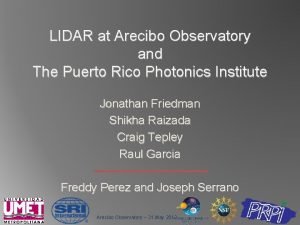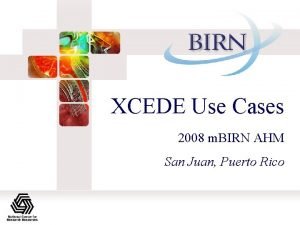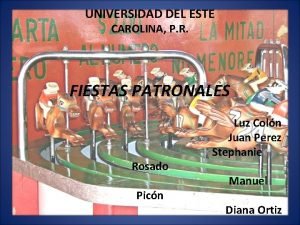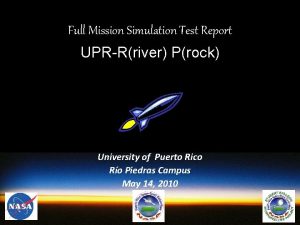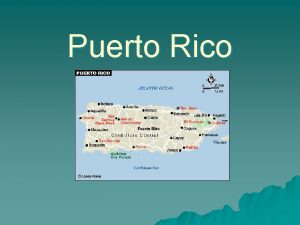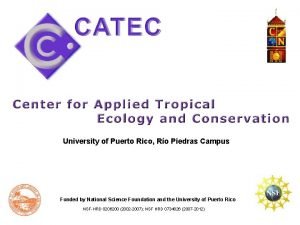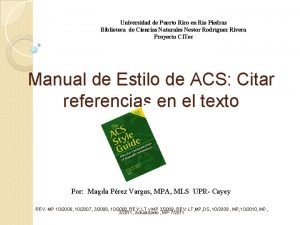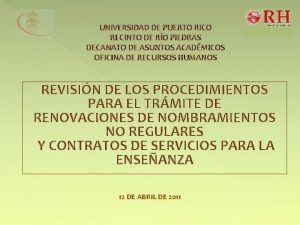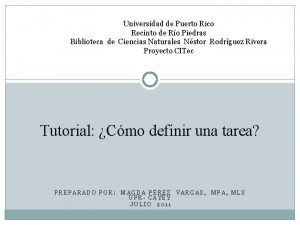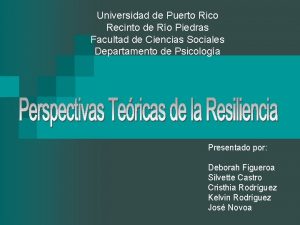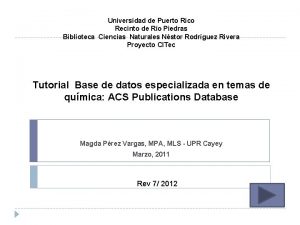UPRRriver Prock University of Puerto Rico Ro Piedras























- Slides: 23

UPR-R(river) P(rock) University of Puerto Rico Río Piedras Campus October 16, 2010 Co. DR Ver 0. 1

Team Members Students: • • • Lisandra Cordero Pedro J. Davila Jose Fuentes Luis Garcia Rafael Gavilane Laura Oben Marilena Ortiz Javier Rodriguez Esteban Romero Luis M. Rodriguez Noel Sanchez Veronica Zayas Faculty Support: • • • Vladimir Makarov Geraldo Morell Gladys Munoz Rafael Velazquez Benjamin Bolaño Oscar Resto

Mission Overview 1) Mission objectives a) Brief explanation b) Expected findings c) Related research/experimentation 2) Design a) Hardware i) Parts ii) Functional block diagrams 3) Rock. Sat Payload Canister Construction Compliance 4) Integration

Objectives • Measurement of selected gases in near-space conditions. • Inorganic and Microorganism aerosols survey in near-space conditions.

Measurement of gases • Why gases? – Measuring gases is an important part of the mission since they can be the building blocks of polypeptides. There is also an interest in measuring the gases that cause the greenhouse effect.

Greenhouse Effect


Finding microorganisms • What type of microorganism? a) Extremophiles: b) Psychrophiles (Below freezing temperatures) c) Piezophiles (High-pressure environments ) d) Radioresistant (Resistant to Ionizing radiation, UV) e) Endospore (Dormant stage)

Why these specimens?


Expected results • Microorganisms or endospores which can resist extremely high levels of radiation. This includes: UV (ultraviolet), X-rays and Gamma rays. Also capable of surviving in low pressures and temperatures. • Polypeptides or amino acids could also be obtained because the Miller and Urey components could be readily available.

Related research • Most of the studies related to atmospheric gases which have been collected at altitudes of 3 km have identified and measured the following: N 2, O 2, Ar, O, COx, CH 4, H 2 S, SO 2, O 3, NOx, CFC, and H 2 O

Supporting Analysis Research • Identification of gases during the flight – Semiconductor gas sensor • Collection of aerosols – Polymer nano-scale filter (25 to 1000 nm) • Bio-Sample Culture Collection and Survey – Sterilized adhesive collector and Microbiology standard procedures • Inorganic particles analysis – Auger, XPS, SIM’s and Time of Flight Mass Spectroscopy • Size distribution and element characterization – Electron Microscopy (TEM, SEM, EDS, ELL’S) • Laser spectroscopy analysis

Collection and Detection Diagram Ram Air Atmospheric Sampling Intake Computer Controlled Flow Valves Full Flow Diaphragm Pressure Regulator AVR Controller and Data Storage Bleeder Computer Controlled Flow Line Bernoulli Gases Exhaust Port 1000 nm 500 nm 200 nm 100 nm 50 nm Exhaust Multiple Semiconductor Gas Sensors Microorganism and Aerosol Battery Filters Gas Canister Sampler

Functional Payload

Functional Block Diagram RAM Air Intake from Outside of the Rocket Notice Electrical Compliance with Wallops Exhaust Solenoid Valve Gas Semiconductor Sensor 6 Gas Semiconductor Sensor 5 Gas Semiconductor Sensor 4 Nano-Filters Sequential Controlled Valves Gas Semiconductor Sensor 3 Intake Solenoid Valve Gas Semiconductor Sensor 1 Exhaust at Rocket unpressurized section Data RBF (Wallops) AVR Board G-Switch Flash Memory 5 V Regulator Z Acceleromet er X/Y Acceleromet er ADC Gas Semiconductor Sensor 2 Power 2 x 9 V Supply Batteries AVR Microcontroller Temperatur e Sensor 2 x 9 V Supply Control Circuit (NPN) 6 channel ADC Air. Core Board Intake Solenoid Valves Airflow Power Interface Sequential Controlled Valves

AVR Schematic Wallops Compliance

Part List Parts: 1) 3/8” PTFC tubing 2) Sequential Valves 3) Polymer type membrane filters 4) Discrete Semi-Conductor Sensors 5) TE Grids 6) Power and controls wiring 7) AVR 8) Gas Flow Control Diaphragms AVR Board 9) ATMega 32 L Microprocessor 10) 16 MB Flash Memory 11) 0 -15 Psi Pressure Sensor 12) 3 -Axis Acceleration 13) Temperature Sensor 14) In-System-Programming 15) Attached Geiger Counter 16) 9 Volt Bus 17) RBF pin on each kit 18) G-switch on each kit

Special Requirements Dynamic Port

Dynamic Port (Ram Air)

Air Intake and Bernoulli Exhaust Ram Air Intake Exhaust

• Rock. Sat Payload Canister User Guide Compliance Type of Restriction Mass allotment: Restriction Payload w/canister Volume allotment: Full canister The payload’s center of gravity (CG): tested In 1”X 1” envelope of centroid? Wallops No-Volt Requirement Compliance: Structure mounts: Hoses are Required Sharing: Yes Top and bottom bulkheads. No mounts to sides of cans. Full Can Status

References • Miller, Stanley L. (May 1953). "Production of Amino Acids Under Possible Primitive Earth Conditions". Science 117: 528. • Thomas, Gary E. (1987) “Trace Constituents in the Mesosphere” Physica Scrypta T 18: 281 -288 • Philbrick, Charles R. ; Faucher, Gerard A. ; Wlodyka, Raymond A. (December 1971). “Neutral Composition Measurements of the Mesosphere and Lower Thermosphere” National Technical Information Service • Nicholson, W, Munakata, N, Horneck, G, Melosh, H, and Setlow, P, (2000). “Resistance of Bacillus Endospores to Extreme Terrestrial and Extraterrestrial Environments” Microbiology and Molecular Biology Reviews, p. 548 -572. • Satyanarayana, T. ; Raghukumar, C. ; Shivaji, S. (July 2005). "Extremophilic microbes: Diversity and perspectives". Current Science 89 (1): 78– 90.
 Ptcb exam puerto rico
Ptcb exam puerto rico Identifica las partes del escudo de puerto rico
Identifica las partes del escudo de puerto rico Pozo séptico prefabricado puerto rico
Pozo séptico prefabricado puerto rico Puerto rico
Puerto rico Alexandra cardona puerto rico
Alexandra cardona puerto rico Guam and puerto rico
Guam and puerto rico Kyokushin karate puerto rico
Kyokushin karate puerto rico Mapa politico de puerto rico
Mapa politico de puerto rico Puerto rico capital
Puerto rico capital El yunque national forest animals
El yunque national forest animals Jibaro dress
Jibaro dress Https//pr.pearsonaccessnext.com/
Https//pr.pearsonaccessnext.com/ Cuento juan el bobo
Cuento juan el bobo Reciclaje de papel en puerto rico
Reciclaje de papel en puerto rico Lidar puerto rico
Lidar puerto rico Elizabeth torres rodriguez puerto rico
Elizabeth torres rodriguez puerto rico Proper adjective for puerto rico
Proper adjective for puerto rico 7 woders of the world
7 woders of the world Ahm puerto rico
Ahm puerto rico Sezma
Sezma Guam and puerto rico
Guam and puerto rico Provincias de puerto rico
Provincias de puerto rico Como se formó puerto rico geologicamente
Como se formó puerto rico geologicamente Fiestas patronales de carolina
Fiestas patronales de carolina
